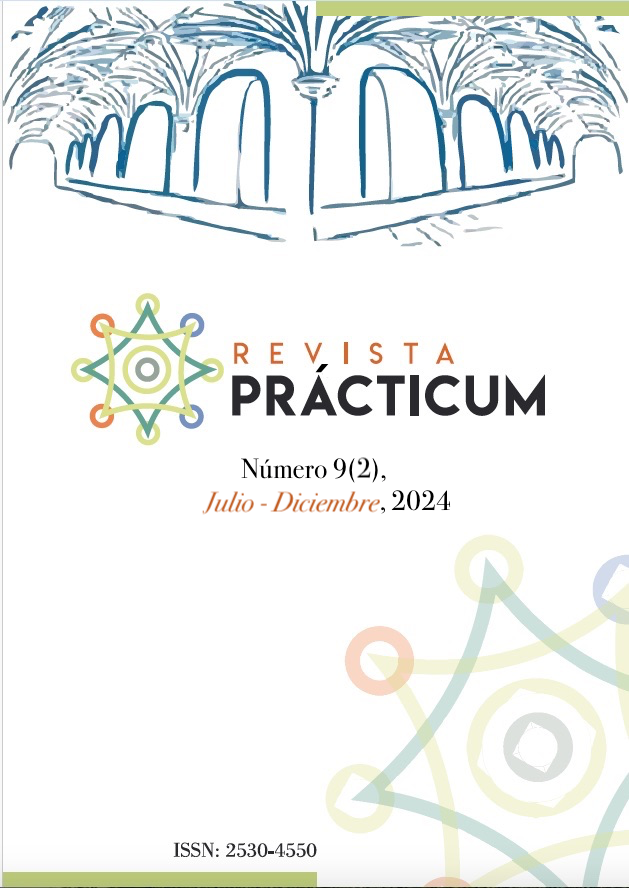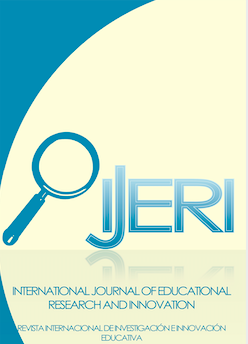The Practicum as an axis for inclusion: a case study from the students' point of view with photo-elicitation
DOI:
https://doi.org/10.24310/rep.9.2.2024.20076Keywords:
Practicum, inclusion, initial training, photo-elicitation, teaching competencesAbstract
Inclusive education has become a central element of the current education system. In this sense, initial teacher training through the Practicum plays an important role in the creation of inclusive environments. The main objective of the study is to analyse how the photo-elicitation strategy in the Practicum enables students to develop competences in favour of educational inclusion through awareness of inclusive actions in the classroom. All this from the point of view of the students in school practices (N=12) and using the case study method. The results show how the photo-elicitation allows students to reflect and understand in terms of educational inclusion. It also shows that the teacher-tutor is the backbone of inclusion, especially through the development of emotional intelligence, and finally, it highlights the need for continuous coordination between institutions to achieve the shared objective.
Downloads
Metrics
References
Allen, J. M. & Wright, S. E. (2014). Integrating Theory and Practice in the Preservice Teacher Education Prácticum. Teachers and Teaching: theory and practice, 20(2), 136-151. https://doi.org/10.1080/13540602.2013.848568
Alonso-Losada, A., & García-Prieto, F. J. (2024). Respuesta a la diversidad en la escuela rural. Un estudio de caso. Revista UNES. Universidad, Escuela Y Sociedad, (17), 91–105. https://doi.org/10.30827/unes.i17.28297
Arias, R., Cantón, I., & Baelo, R. (2017). El Prácticum de las universidades españolas. Un análisis de las guías docentes. Revista Interuniversitaria de Formación de Profesorado 31(1), 109-120. https://doi.org/10.9685/i3233
Barbour, R, & Morgan, D. L. (2017). A new era in focus groups: Challenges, innovations and practice. Palgrave MacMillan. https://doi.org/10.1057/978-1-137-58614-8.
Bautista, A., Rayón, L., & de la Heras, A. M. (2020). Use of Photoelicitation to evoke and solve Dilemmas that prompt changes Primary School Teachers’ visions. Journal of New Approaches in Educational Research, 9(1), 137-152. https://doi: 10.7821/ naer.2020.1.499
Bruno, A. & Dell’Aversana, G. (2018). Reflective Practicum in Higher Education: The influence of the learning environment on the quality of leraning. Assessment & Evaluation in Higher Education, 43(3), 345-358. https://doi.org/10.1080/02602938.2017.1344823
Caena, F. (2014). Initial teacher education in Europe: an overview of policy issues. European Commission.
Domínguez-Fernández, G. & Prieto, E. (2019). Experiencias y reflexiones sobre la formación inicial del profesorado de enseñanza secundaria: Retos y alternativas. Profesorado, Revista de Currículum y Formación del Profesorado, 23(3), 1-13. https://doi.org/10.30827/profesorado. v23i3.11229
Calviño-Santos, G. (2024). Elicitación visual y narrativa histórica en la educación: Un estudio del retrato de Alfried Krupp por Arnold Newman. Communiars. Revista De Imagen, Artes Y Educación Crítica Y Social, (11), 43–57. https://revistascientificas.us.es/index.php/Communiars/article/view/26035
Edo-Agustín, E., Pérez-Castejón, D., Domingo-Cebrián, V., & Monforte-García, E. (2022). El trabajo en red de las instituciones educativas: modelo de innovación pedagógica en la provincia de Teruel. En Carrascal, S. y Camuñas, N. (Eds.), Docencia y aprendizaje: Competencias, identidad y formación de profesorado (pp. 567-586). Tirant Humanidades.
Esteban, F. (2016). La formación del carácter de los maestros. Edicions Universitat Barcelona.
Eurydice (2018). La profesión docente en Europa: Acceso, progresión y apoyo. Oficina de Publicaciones de la Unión Europea.
Flick, U. (2015). Introducción a la investigación cualitativa. Morata.
García-Lastra, M. (2022). Coeducación y formación del profesorado: una (nueva) oportunidad para repensar la práctica educativa. En N. Morales (Ed.), Igualdad y coeducación. Retos para las escuelas del siglo XXI (pp. 33-45). Ediciones Universidad de Salamanca. https://doi.org/10.14201/0AQ0336
Gravett, S., & Kroon, R. (2023). Learning to become a teacher: Student teachers’ experiences and perceptions of a one-year initial teacher education programme. Educational Studies, 49(6), 861-876. https://doi.org/10.1080/03055698.2021.1935216
Hargreaves, A. & Fullan, M. (2015). Professional capital: Transforming teaching in every school. Teachers College Press.
Hernández-Amorós, M. J., Urrea-Solano, M. E., Alós, L. G., San Martín, N. G. L., López, R. S., & Fernández, J. M. G. (2017). Actitudes de los maestros en formación sobre la diversidad e inclusión educativa. International Journal of Developmental and Educational Psychology, 4(1), 45-53.
Lacueva, A., Imbernon, F., & Llobera, R. (2003). Enseñando por proyectos en la escuela: la clase de Laura Castell. Revista de Educación, 332, 131-148.
López-Esteban, C. (ed.) (2022). Los ODS. Avanzando hacia una educación sostenible. Ediciones Universidad de Salamanca. https://doi.org/10.14201/0AQ0327
Maravé-Vivas, M., Salvador-García, C., Gil-Gómez, J., & Chiva-Bartoll, O. (2022). Promoción de la inclusión educativa en la formación docente a través de la aplicación de Aprendizaje-Servicio Universitario en el ámbito de la diversidad funcional. Retos, 45, 163-173. https://doi.org/10.47197/retos.v45i0.92688
Mascarell-Palau, D. (2020). Narrativas visuales de la Facultad de Magisterio mediadas por teléfonos móviles. Una mirada pedagógica y artística a la Investigación Basada en las Artes. Revista Sonda. Investigación En Artes Y Letras, 9, 43–57. https://doi.org/10.4995/sonda.2020.17852
Organización para la Cooperación y el Desarrollo Económico (2019). TALIS 2018 Results. Teachers and school leaders as lifelong learners. OCDE.
Onrubia, J., Mauri, T., Colomina, R. & Clará, M. (2016). Una propuesta para la enseñanza de la reflexión conjunta en el practicum de maestro. Revista CIDUI, 3. https://cutt.ly/YGq9Wxk
Peirce, CH. S. (1986). La ciencia de la semiótica. Nueva visión.
Pérez-Castejón, D., & Vigo-Arrázola, M. B. (2022). Actitudes y condicionantes de los futuros docentes hacia la educación inclusiva: estudio meta-etnográfico. Contextos Educativos. Revista De Educación, (29), 203–222. https://doi.org/10.18172/con.4977
Rayón, L., Romera, M.J., De las Heras, A.M., Torrego, A. & Bautista, A. (2021). Foto-Elicitación e indagación narrativa visual en estudio de casos y grupos de discusión. New Trends in Qualitative Research, 5, 41–56. https://doi.org/10.36367/ntqr.5.2021.41-56
Rodríguez-Fuentes, A., & Caurcel-Cara, M. J. (2020). Análisis actitudinal de las nuevas generaciones docentes hacia la inclusión educativa. RELIEVE - Revista Electrónica De Investigación Y Evaluación Educativa, 26(1). https://doi.org/10.7203/relieve.26.1.16196
Romera, A.M. & Ruiz, E.M. (2017). Motivaciones hacia la formación inicial pedagógica en estudiantes del Máster en educación secundaria de la Universidad de Granada. Revista Española de Orientación y Psicopedagogía, 28(3), 63-81. https://doi.org/10.5944/reop.vol.28.num.3.2017.21619
Sáez-Pérez, M. M. (2022). Respuestas a las necesidades socioeducativas de las familias dentro del sistema educativo: participación, inclusión y vínculo desde la Educación Social. En S. M. García-Vargas (Ed.), Retos actuales del sistema educativo: propuestas actuales desde la educación social (pp. 103-119). Octaedro.
Santos-González, C. (2022). Atención a la diversidad e inclusión educativa: formación inicial del profesorado y autopercepción de competencias. Ciencia y Educación, 6(3), 7-20. http://hdl.handle.net/10347/29571
Sebastiá-Alcaraz, R., Tonda-Monllor, E. M., & García-Rubio, J. (2022). Los Objetivos de Desarrollo Sostenible en el currículo escolar según la experiencia del alumnado en el prácticum II de Magisterio. Didáctica de las Ciencias Experimentales y Sociales, 43, 91-106. https://doi.org/10.7203/dces.43.25305
Shaw, P.A. (2020) Photo-elicitation and photo-voice: using visual methodological tools to engage with younger children’s voices about inclusion in education. International Journal of Research & Method in Education, 44(4), 337-351. https://doi.org/10.1080/ 1743727X.2020.1755248
Solís-García, P., Gallego-Jiménez, M. G., & Real Castelao, S. (2022). ¿El aprendizaje cooperativo promueve la inclusión? Revisión sistemática. Páginas de Educación, 15(2), 1-21. https://doi.org/10.22235/pe.v15i2.2803
Soto-Montes, V. (2021). Educació inclusiva en el Pràcticum de la formació inicial docent a Xile: com s’ha avançat i quins desafiaments falta assolir. REIRE Revista d’Innovació I Recerca En Educació, 15(1), 1–8. https://doi.org/10.1344/reire.37148
Stenhouse, L. (1991). Métodos de estudio de casos. En T. Husan & T.N. Postlethwaite (Eds.), Enciclopedia Internacional de la Educación (pp. 3911-3916). Vicens Vives.
Tárraga Mínguez, R., Grau Rubio, C., & Peirat Chacón, J. (2013). Actitudes de los estudiantes del Grado de Magisterio y del Máster de Educación Especial hacia la inclusión educativa. Revista Electrónica Interuniversitaria de Formación del Profesorado, 16(1), 55–72. https://doi.org/10.6018/reifop.16.1.179441
Telo, A. C., Duprat, M. F., Ulrich, J. M., Pigem, E. N., Puiggròs, N. R., & Baños, R. V. (2023). El Prácticum en el grado de Pedagogía de la UB: avanzando en el nuevo “Modelo de las 4-I: Inclusión, Integración, Innovación e Internacionalización”. Revista d'Innovació Docent Universitària, 52-62. https://doi.org/10.1344/RIDU2023.15.5
Torres-Hernández, N. & Gallego-Arrufat, M.J. (2020). La evaluación en informes de prácticas del grado de Maestro en Educación Primaria Revista Practicum, 5(2), 65-82. https://doi.org/10.24310/RevPracticumrep.v5i2.10167
Tur-Porcar, A., Llorca-Mestre, A., & Mestre-Escrivá, V. (2021). Aggressiveness, instability and social-emotional education in an inclusive environment. Comunicar, 66, 45-55. https://doi.org/10.3916/C66-2021-04
Organización de Naciones Unidas, la Educación, la Ciencia y la Cultura (2015). Education 2030. Incheon Declaration and Framework for Action. UNESCO.
Vanegas, C. (2018). Prácticas pedagógicas reflexivas durante la formación inicial de profesores: una revisión de literatura. Brazilian Applied Science Review, 2(7), 2220-2243. https://doi.org/10.36390/telos232.06
Villate, A. S., Negrillo, E. A., Marcén, N. E., y Ordás, R. P. (2024). Experiencia didáctica de aprendizaje-servicio de estudiantes de Magisterio en el proyecto La Ciudad de las Niñas y los Niños. Revista educación, investigación, innovación y transferencia, (4), 23-48. https://doi.org/10.26754/ojs_reiit/eiit.202418858
White, S. & Forgasz, R. (2016). The Practicum: The place of experience? En J. Loughran y M.L. Hamilton (Eds.), International Handbook of teacher education 1, 231-266. Springer.
Zabalza, M. (2006). Buscando una hoja de ruta en la formación del profesorado. Revista de Educación, 340, 51-58.
Zabalza, M. A. (2016). El Prácticum y las prácticas externas en la formación universitaria. Revista Prácticum, 1(1), 1-23. https://doi.org/10.24310/RevPracticumrep.v1i1.8254
Zuñiga, C. L. (2021). La inteligencia emocional junto a la inclusión para una adecuada convivencia, rendimiento y motivación. Revista de Educación Inclusiva, 14(2), 182-195. https://revistaeducacioninclusiva.es/index.php/REI/article/view/743

Downloads
Published
How to Cite
Issue
Section
License
Copyright (c) 2024 Estefanía Monforte-García, Esther Edo-Agustín (Autor/a)

This work is licensed under a Creative Commons Attribution-NonCommercial-ShareAlike 4.0 International License.
Acceptance of the work implies that the author grants Revista Prácticum the exclusive rights to reproduce, distribute and sell his or her work worldwide, both in digital and paper formats, CD-ROM, etc.
Likewise, the authors shall grant Revista Prácticum the rights of dissemination, public communication on the Internet and IT networks, data buses, as well as any other portals or electronic devices for online consultation of its contents and extracts, under the conditions of the portal, repositories or databases where the work is stored.
Revista Prácticum allows authors to publish and disseminate their articles and works on their personal websites, research teams, institutional repositories and scientific databases. All this in accordance with the Creative Commons 4.0 License








8.png)








